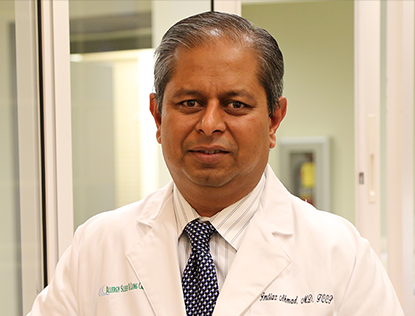By Imtiaz Ahmad, M.D., M.P.H., F.C.C.P., Board Certified in Sleep Medicine, Founder of Allergy Sleep & Lung Care
As back to school season begins, it’s important for parents to get their children into a healthy sleep schedule. But as any parent knows, getting them to unplug from technology, into bed early and up in time for the early-morning bus can be a challenge.
A potential solution: later school start times.
Studies show that starting middle and high school before the sun rises is out of sync with the biological clocks of young people. They aren’t just fighting you to wake up. Adolescents are fighting their biological clocks telling them to sleep longer, resulting in potentially chronic sleep deprivation.
Teenagers need on average nine hours of sleep per night for optimal performance, health and brain development, but they average fewer than seven hours per school night by the end of high school.
Most teens would need to be asleep at 8-9 p.m. to get enough sleep with these hours. This isn’t possible for both biologic and cultural reasons. During puberty, adolescents are biologically programmed to fall asleep later in the evening than children and adults, and rise later in the morning.
Most teen sleep deprivation is a product of wake up, not bed, time.
The American Academy of Pediatrics recommends that middle and high schools start at 8:30 a.m. or later. Today many schools start much earlier, often around 7 a.m. Bus pick-ups start between 5:15 a.m. and 6:30 a.m., requiring students to wake hours before what is healthy, safe, and developmentally appropriate for their still-growing brains and bodies. In addition, this sets them up for a lifetime of bad sleep hygiene.
By starting schools later in the day, studies show adolescents can experience improved alertness, memory, attention, and cognitive processing skills, as well as improved academic performance, particularly in in disadvantaged students.
I urge parents and school districts to educate themselves on the benefits of earlier school start times and get involved.
Until that change happens, it is crucial for children and teenagers to get into a healthy sleep schedule. Avoid bright light from cellphones, laptops and televisions. Nix caffeine in the afternoon and stick to the set schedule.
If this type of common sense sleep hygiene does not improve symptoms, it’s important to see a sleep specialist to manage symptoms. For example, early phase narcolepsy often begins in adolescents, causing problems in school. It’s important to identify and properly treat this disease before it causes irreparable harm to an adolescent’s education.
It’s time to wake up to the chronic problem of sleep deprivation among adolescents. Later school start times are clinically proven to increase school performance. Our children deserve that.
For more information about my practice, Allergy Sleep & Lung Care, please visit www.LungCare.net, or call (239) 437-6670.






